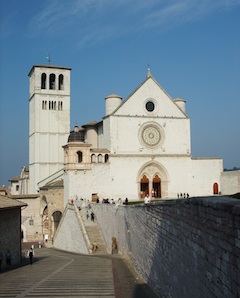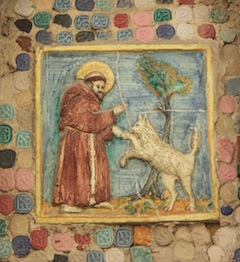The Christian Declaration on Nature - Assisi 1986
 |
 |
 |
He created nothing unnecessarily and has omitted nothing that is necessary. |
This is the Christian Declaration on Nature, taken from the original Assisi Declarations on Nature. These were created in 1986, at a meeting held in Assisi by WWF-International and stemming from an idea by HRH the Prince Philip, at which five leaders of the five major world religions – Buddhism, Christianity, Hinduism, Islam and Judaism – were invited to come and discuss how their faiths could help save the natural world.
Link here to read all five original Assisi declarations.
The Christian Declaration on Nature
By Father Lanfranco Serrini, Minister General, OFM Conv
"PRAISE THE LORD ... Praise him, sun and moon, praise him, all you shining stars! For he commanded and they were created...Praise the Lord from the earth, you sea monsters and all deeps, fire and hail, snow and frost, stormy wind fulfilling his commands!" (Psalm 148)
To praise the Lord for his creation is to confess that God the Father made all things visible and invisible; it is to thank him for the many gifts he bestows on all his children.
 |
 |
 |
The Basilica in Assisi, Italy, where this Declaration was first made |
God created everything that exists, freely, by his word, and out of nothing. He alone is totally other, transcendent and immutable, whereas all creatures are contingent, mutable and wholly dependent on him for their existence. No creature can claim to be part of his nature or a "spark" of his Being; but, by reason of its created origin, each according to its species and all together in the harmonious unity of the universe manifest God's infinite truth and beauty, love and goodness, wisdom and majesty, glory and power.
God declared everything to be good, indeed, very good. He created nothing unnecessarily and has omitted nothing that is necessary. Thus, even in the mutual opposition of the various elements of the universe, there exists a divinely willed harmony because creatures have received their mode of existence by the will of their Creator, whose purpose is that through their interdependence they should bring to perfection the beauty of the universe. It is the very nature of things considered in itself, without regard to man's convenience or inconvenience, that gives glory to the Creator.
But it is especially through man and woman, made in the image and likeness of God and entrusted with a unique dominion over all visible creatures, that the Lord's goodness and providence are to be manifested. This is how the Psalmist sings of man's nobility: "When I look at the heavens, the work of your fingers, the moon and the stars which you have established; what is man that you are mindful of him, and the son of man that you care for him? Yet, you have made him little less than God, and you crown him with glory and honour. You have given him dominion over the works of your hands."
The Fathers of the Church understood well the marvel of humanity's dual citizenship and the responsibilities it placed upon him. In the words of St Gregory of Nazianzen, "God set humanity upon earth as a kind of second world, a microcosm; another kind of angel, a worshipper of blended nature... We were a king of all upon earth, but subject to heaven; earthly and heavenly; transient, yet immortal; belonging both to the visible and to the intelligible order; midway between greatness and lowliness".
 |
 |
 |
In his 'Canticle of Brother Sun' St Francis called all creatures his brothers and sisters because they are God's gifts and signs of his providential and reconciling love. |
Most certainly, then, because of the responsibilities which flow from his dual citizenship, humanity's dominion cannot be understood as licence to abuse, spoil, squander or destroy what God has made to manifest his glory. That dominion cannot be anything other than a stewardship in symbiosis with all creatures. On the one hand, humanity's position verges on a viceregal partnership with God; on the other, our self-mastery in symbiosis with creation must manifest the Lord's exclusive and absolute dominion over everything, over humans and over our stewardship. At the risk of destroying ourselves, we may not reduce to chaos or disorder, or, worse still, destroy God's bountiful treasures.
Every human act of irresponsibility towards creatures is an abomination. According to its gravity, it is an offence against that divine wisdom which sustains and gives purpose to the interdependent harmony of the universe.
Christians believe that the first man and womans' refusal to live according to divine wisdom introduced disharmony into their relationship with God and creatures, and this rebellion has perpetuated itself in history in various forms of social and personal injustice, domination and exploitation, making it impossible for men and women to live in concord with one another and with the rest of creation.
But the heart of Christian faith resides in its proclamation of God's merciful fidelity to himself and to the works of his hands. Christians believe that God the Father has not abandoned men and women to their sinful ways but has sent the Saviour to bring redemption and healing to everyone and to all things. Indeed, they firmly confess that Jesus of Nazareth is the Son of God made man, that he is the fulfilment of his Father's covenant with Abraham for the salvation of all peoples and with Noah on behalf of all creation. They maintain that, risen from the dead and ascended into heaven in his glorified humanity, he reconciles all things visible and invisible, and that all creation is therefore purposefully orientated, in and through him, towards the future revelation of the glorious liberty of God's children, when, in the new heavens and the new earth, there will no longer be death, mourning, sadness or pain. Through Christ and through his life-giving Spirit, the Father creates and sanctifies, gives life, blesses and bestows all good things.
Christians therefore cannot be pessimistic about the future of the world, nor believe in its periodic disintegration and renewal, both of which would deny
Christ's future coming to judge the living and the dead, when he shall bring his recompense to repay everyone for what he has done. The God of the living will not destroy what he has created, but, in the future transformation of the world, he will reward the just and punish the evil.
This Gospel influenced the relationship of men and women to the environment through monastic institutions. Benedictine monks, especially inspired by their founder's evangelical sense of the stewardship of natural resources, advocated a harmonious union between prayer and work, between intellectual and physical effort, and between theoretical and practical skills.
This Good News produced a unique example of humanity's reconciliation with all creatures in St Francis of Assisi, admired and invoked as the patron of ecologists and of those who are dedicated to the establishment of harmonious relations with the environment. Since God can express his will through all of his works, Francis was submissive to all creatures and scanned creation attentively, listening to its mysterious voices.
In his 'Canticle of Brother Sun' the saint called all creatures his brothers and sisters because they are God's gifts and signs of his providential and reconciling love. To God alone do they belong, to him they bear a likeness, and in his name Mother Earth, our sister, feeds us. In his personalized relationship with all creatures, St Francis recognised his duty to reciprocate divine love with love and praise, not only in the name of creatures, but in, with and through them.
For St Francis, work was a God-given grace to be exercised in that spirit of faith and devotion to which every temporal consideration must be subordinate. All human effort in the world must therefore lead to a mutual enrichment of man and creatures.
Many are the causes of the ecological disaster which humankind faces today. Without pretending to be complete, the following should be singled out: uncontrolled use of technology for immediate economic growth, with little or no consideration for the planet's resources and their possible renewal; disregard for just and peaceful relations among peoples; destruction of cultures and environments during war; ill-considered exploitation of natural resources by consumer-orientated societies; unmastered and unregulated urbanization; and the exclusive preoccupation with the present without any regard for the future quality of life.
Therefore, in the name of Christ, who will come to judge the living and the dead, Christians repudiate:
-- All forms of human activity - wars, discrimination, and destruction of cultures - which do not respect the authentic interests of the human race, in accordance with God's will and design, and do not enable humans as individuals and as members of society to pursue and fulfil their total vocation within the harmony of the universe;
-- All ill-considered exploitation of nature which threatens to destroy it and, in turn, to make humanity the victim of degradation.
In the name of Christ, who will repay everyone for good works, Christians call upon all men and women to pursue:
-- A synthesis between culture and faith;
-- Ecumenical dialogue on the goals of scientific research and on the environmental consequences of the use of its findings;
-- The priority of moral values over technological advances;
-- Truth, justice and the peaceful coexistence of all peoples.
|

